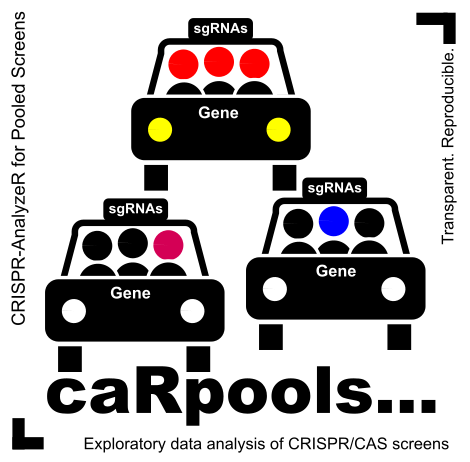Attention: Our new tool is available now!

Platform-independent, interactive and exploratory analysis, annotation and documentation of CRISPR screens
Visit the Github page
Visit the Live Demo

caRpools - a software package for the analysis CRISPR/Cas9 pooled screens
Issues
If you have issues or problems PLEASE us the ISSUES page.
Attention: Due to the downtime of the community-server of biomaRt, caRpools 0.82.5 does not function properly. Use 0.83 that uses by default the Ensembl servers for data annotation.
Additional Information
Dear users, the latest CRAN version is not compatible with the virtual machine due to rJava issues. I am right now working on a new version without any java dependencies and will release it for alpha/beta testing via the releases channel. In case you are interested in beta testing the new caRpools version, please send me an email (jan.winter@dkfz.de) so that I know who is using it and provide further support. In general, the beta release will be avaible for everyone.
Once the manual and vignette is updated for the new, far advanced version, it will be released on CRAN.
Description
CaRpools is an R package forexploratory data analysis of pooled CRISPR/Cas9 screens. It aims to provide a user-friendly pipeline for end-to-end analysis of screening data. As an output, it generates standardized PDF and HTML reports that include:
- In-depth analysis of screening quality
- Candidate hit calling using multiple, independent algorithms
- In-depth analysis of sgRNA phenotypes
- XLS output for storage and follow-up analysis
- Annotation of candidate genes using biomaRt
Users fill out a configuration file and caRpools runs a complete analysis workflow, including NGS data extraction and mapping.
Download the VirtualBox appliance of caRpools
The VirtualBox appliance can be downloaded from HERE
It provides you a ready-to-use virtual appliance, so that you do not need to install any additional R packages or tools.
Download R package
You can download the R package either
- within R via
install.packages("caRpools") - or as a .tgz file directly from HERE
Manuals
- CaRpools Virtual Box - short guide
- CaRpools Installation - short guide
- CaRpools Usage - short guide
- CaRpools - full manual
- CaRpools - full manual PDF
Tip for Mac Users
If you can't get RStudio to call system commands, you need to start Rstudio from command line.
In order to allow RStudio to start system commands, please start RStudio via the terminal by typing:
open -a rstudio
Contact
Jan Winter (jan.winter@dkfz.de) Web http://www.dkfz-heidelberg.de/en/signaling
Reference
Winter, J., Breinig, M., Heigwer, F., Brueggemann, D., Leible, S., Pelz, O., Zhan, T., Boutros, M. (2015) caRpools: An R package for exploratory data analysis and documentation of pooled CRISPR/Cas9 screens. Bioinformatics
Changelog
1.0.241 ALPHA RELEASE
- major overhaul to underlying R code
- new MIACCS file structure with easier use
- multiple replicates possible with automatic detection
- comparing groups made straight-forward
- more to follow...
- ALPHA VERSION, if issues occur, please tell me! NO DOCUMENTATION SO FAR.
0.83 (latest CRAN)
- changed data annotation to use Ensembl server for biomaRt - please see the changes in the miaccs file for "database"
- updated Manual and Rd file
0.82.5
- updated R documentation
- improved speed
0.82.4
- updated R documentation
- modified carpools.read.count.vs for automatic replicate detection
- modified package to allow usage of more than two replicates
- fixed bugs
- improved speed
0.82.3
- updated R documentation
0.82.2
- made biomaRt annotation faster (get.gene.info)
- added additional sgRNA dropout information in Rmd templates
- made compare.analysis faster
- removed unnecessary code
0.82
- fixed naming issues in perl files CRISPR-mapping.pl and CRISPR-extract.pl
- fixed rare naming glitch in biomaRt annotation
- streamlined code